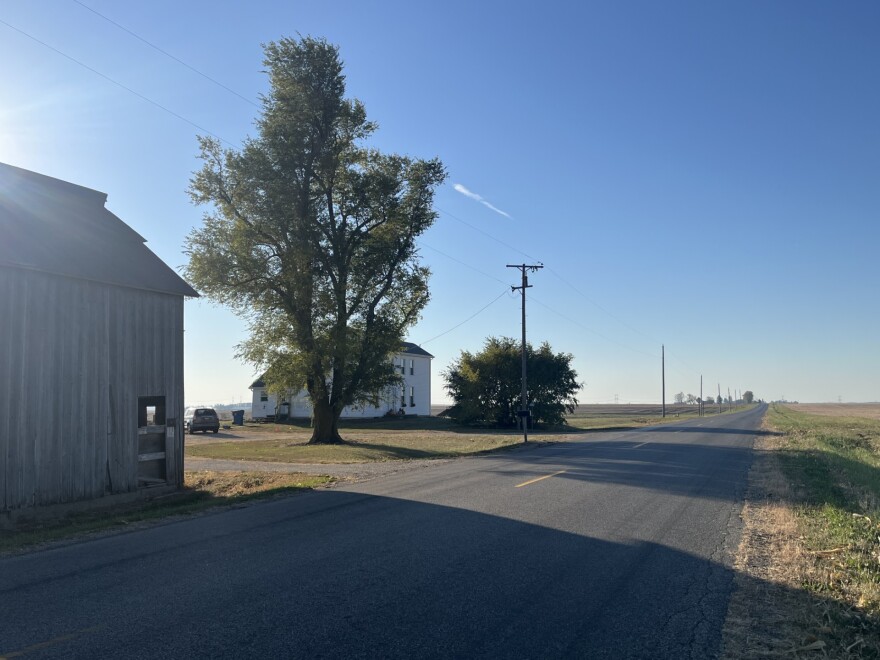Sandwiched between Roanoke and Benson a little less than an hour outside Peoria, there's a white farmhouse sitting on almost an acre of land. That's the new home of Down River Farm and its owner, first generation farmer Evan Barry.
“I grew up in the suburbs of Chicago, so I was very distant from farming, but I ended up moving out to North Carolina,” he said. “Basically working a job where I had some time to fill. I ended up volunteering on a farm.”
Barry was amazed by the process of growing food and the food system. He says long conversations with farmers kept him engaged and he took a liking to the physicality of the work.
“[Farming] kind of came at me from all angles and kind of encapsulated me,” said Barry.
Two growing seasons of volunteering and work exchange later, Barry found a job at Henry's Farm in Central Illinois. Then he started preparing to strike out on his own.
In 2018, he rented land out near Kira's Flowers in East Peoria and started small, financing a tractor and growing annual vegetables like carrots, radishes, turnips and kale.
“I grew some crops that I lost money on and probably didn’t make, like I said, make any financial sense to be growing,” said Barry. “But, I think it’s all part of the process and you learn what people want and what’s worth your time.”
Barry enjoyed building a customer base in the community, selling his products at markets and whittling down his crop selection. But while he was growing, there were some issues with the land.
For one, Barry was anxious about the amount of compost he used, and the thousands of dollars worth of resources he dumped into the soil every year for land he didn't own. Then, there was the water issue.
“Basically, our well would run dry every summer and I would be stuck with no water to like wash vegetables, irrigate, to even take showers, to flush our toilet,” Barry said. “And it just became unsustainable to grow there.”

So, Barry entered the agriculture real estate market. He connected with a realtor, learned about lenders and down payments, and viewed dozens of properties over three years.
As he started his search, the price of land and homes skyrocketed and interested rates climbed.
He first viewed the property in Benson in April. While it wasn't the dream property he had imagined, it was a place he could farm.
“Maybe not permanently, like forever,” Barry said. “But I can really grow the business here for like ten years and, like, invest in it properly.”
Looking out in any direction from Barry's property, you can see bare fields, acres and acres of harvested soybeans. He's surrounded, on all sides, by large operations.
As the price of land grows beyond the value of the crops you can grow on it, it's difficult to say how exactly a small farm gets a foothold.
“There’s a lot of loan programs through the USDA, even some grant programs popping up through the USDA in order to get both training and capital in order to start operations,” said Barry.
According to the American Farm Bureau, family farms account for 90% of total agricultural production value. At the same time, farm and ranch families comprise less than 2% of the population.
“It is challenging, because, as there are fewer farmers there’s less educational opportunities to learn how to do this,” said Barry. “And farming is not something you can just go to college and learn how to do it and then go start your own operation. You have to work on farms, like, period.”
Barry says he's seen the growth of cooperative models, attempting to provide a firm foundation for new farmers.
“People are interested in, you know, like nonprofits purchasing a piece of property and having incubator farms on them,” he said. “So you can learn your skills before putting skin in the game.”

Barry has worked up ground around the farm for carrots, radishes, and spinach. Fledgling trees stand ready in the beginning of an orchard. He's planning to put up greenhouses soon so he can grow through the cold.
“If you’re young, get some education, get some experience, work on some farms, learn some stuff,” he said. “And then try to rent land, with low overhead, and try to do it yourself.”
For now, Barry is the sole employee of Down River Farm. But, eventually, maybe it becomes the place another young person becomes fascinated with growing our food.
You can find Barry and his produce at local markets, including the upcoming Peoria Thanksgiving Market.


